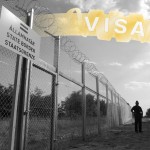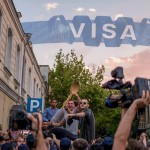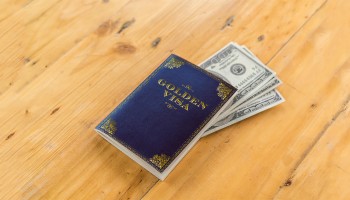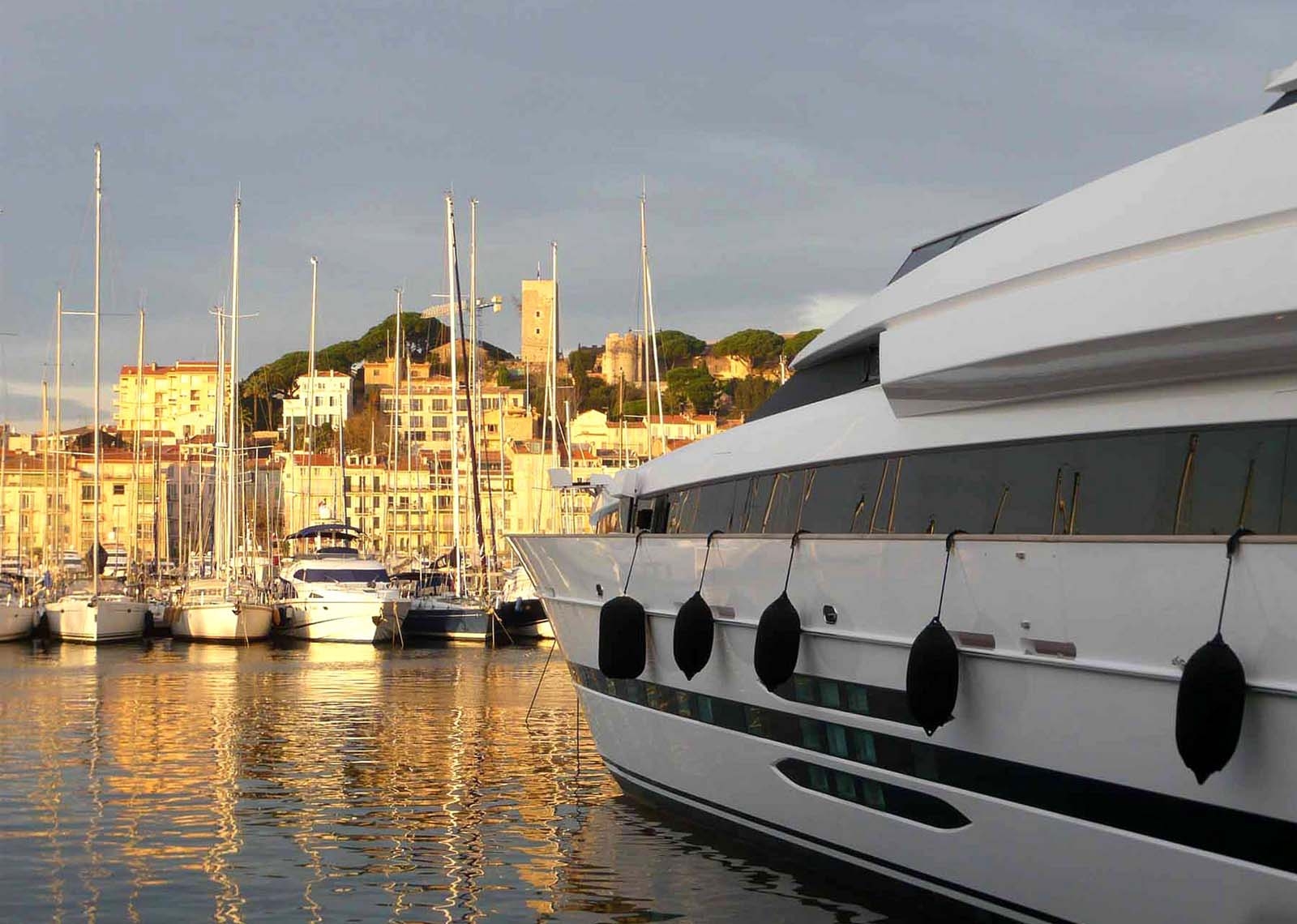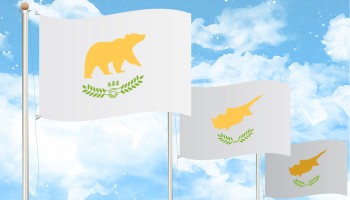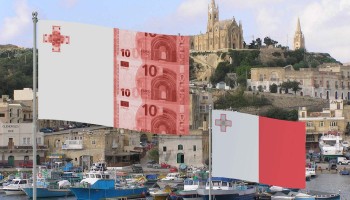CANNES, France — The panoramic windows of this city’s Palace of Festivals and Congress Hall look out over the Mediterranean Sea — and the port where the super-yachts are berthed. Some bear Russian names: Asya, Anyuta, Lady Marina.
While refugees fleeing the war in Syria must cross the sea on inflatable boats, more prosperous potential immigrants arrive in style: on three-decked vessels equipped with Jacuzzis and swimming pools. They may even find helpful immigration lawyers waiting to meet them if they haven’t brought their own.
Cannes is host to the world’s most famous film festival, an annual magnet for the rich and famous. But many people flock to the city for other reasons. Last October, a swarm of real estate agents, tax advisors, and “special” lawyers gathered for an “International Emigration & Luxury Property Expo” (“Cannes IELP Expo” for short), which caters to the Golden Visa trade. This multi-billion-dollar global industry helps those with money obtain residence permits, or even citizenships, in other countries by agreeing to invest specified amounts.
The entrance fee for this two-day event is €500. This does not include accommodations, transport, or even a coffee break at the venue. An additional €500 buys entrance to an evening gala in the French style — featuring live music, Champagne, and oysters — in the nearby five-star Hotel Barrière Le Majestic.
In theory, the money brings the various service providers in contact with potential clients. In turn, these private individuals from politically unstable countries can find all the citizenship services they need in one place.
The conference organizers promised that the guest list would include some of the world’s wealthiest and most powerful businessmen, including “members of Forbes and Fortune 500.”
Wealthy and powerful or not, what’s clear immediately is that a lot of them speak Russian. And they are quite a gallery of characters.
High Net Worth Individuals
Andrey Nosenko is a Russian businessman in his fifties, dressed soberly in a dark suit.
“You can see ‘MBSI’ on my business card. That means: ‘management, business, service, intelligence,’” he says mysteriously. “Like the CIA.”
He is sitting in a small café with his companion, Valentina Makeeva, while presentations in a nearby conference room drone on about investment visas in Malta, Cyprus, the US, and Canada. Makeeva toys with a lemon tart as Nosenko describes his business dealings.
“My company manages real estate in the Moscow region — a license to print money,” he says, although the real estate market in the Russian capital has been deflating for the last three years. Makeeva looks at him quizzically.
“But if we’re talking about serious money — and I am talking about millions — listen and remember: Scientific. Research. Institute.” He raps out the words, but gets lost and has to start his sales pitch over. The words tumble out, nearly running together.
“Research and Development Institute. We do research and education and we’re also engaged in the construction industry. We offer turnkey contracts of different kinds. Check the information on our website,” he says, but then remembers: “Only our website isn’t operational yet. Our institute was incorporated only three months ago.”
Nosenko hurries to sound reassuring. “But don’t worry, we’re part of a big international group based in the US, with headquarters in London. There are very high-ranked people involved, including government officials. Only I won’t tell you the name of the group, because we’re not interested in advertising.”
Tatyana Kizilova, a young woman with a kind face, stops by the table. She appears to know Nosenko and Makeeva and presents a business card from Stroyinvest, a small construction company in Moscow. She talks about the work without enthusiasm.
“But I’m starting my own business,” she says, her voice becoming dreamy. “I craft Christmas–tree decorations. Just recently I bought my very first laser fret saw!”
It does not appear that this group could afford tickets to the conference, let alone a Golden Visa. So why are they here?
“I didn’t pay a penny for this,” Kizilova says with dignity, as Nosenko and Makeeva nod in agreement. They, and many other small businessmen, are guests of the promoters.
United Nations on the Riviera
The official organizer of the expo is a company registered in the United Kingdom, but its ultimate owners are two businessmen from Ukraine: Roman Iukhymenko and Pavlo Gorbenko. Iukhymenko also runs a polygraph business and a company that provides electrical engineering services. Gorbenko lives in Thailand; it is unknown if he has other businesses.
Their company’s conferences take place not just in Cannes, but also in Moscow, Kyiv, Baku, Mumbai, and Shanghai.
The staff at the Cannes event, at least, all speak Russian. And it’s not only them — it seems like every stand where the agents offer their services has at least one Russian-speaker.
But guests from Azerbaijan, India, Pakistan, and China also roam the halls.
“Lots of interesting characters were invited by the organizers just to make a crowd,” explains Elena Rudaya of Immigrant Invest, a law firm that says it provides all the services “golden immigrants” need.
“We don’t expect to meet our ultimate clients here,” she says. “At best, [we meet] their representatives. Still, we sometimes take part in such events because it raises the profile of your company. If you present yourself at conferences, that means you exist — you’re part of the industry, not a mailbox company.”
“And besides, you can establish some valuable connections. We’ve met some interesting people from India and Uzbekistan.”
At first glance, the conference doesn’t seem to be quite as advertised. It’s not exactly members of the Forbes list who are elbowing each other at the information stands. It’s more like a grab-bag of brokers, real-estate agents, representatives of potential clients, and other characters.
But on closer inspection, here and there, expensively dressed people are conducting leisurely negotiations.
Further discussions take place in the lobby of the Hotel Barrière Le Majestic.
Lots of Money, Lots of Rules
The Golden Visa concept was born in 1984 in the Caribbean, on the tiny dual-island nation of St. Kitts and Nevis.
The business is still going strong there. Today, a financial contribution of $250,000 to a designated foundation, or the purchase of property valued at least $400,000 — plus various fees — wins the applicant a St. Kitts and Nevis passport and access to more than 125 countries, including the United Kingdom, European Union, Singapore, and Hong Kong.
(There are even special deals to be had: Until March 30, 2018, a one-time donation of $150,000 to the island’s Hurricane Relief Fund was enough to get you citizenship.)
Since then, Golden Visas have become increasingly popular in many other countries, including Canada and the US. A number of European countries have also established their own investment visa programs.
The standards vary. While Malta and Cyprus freely offer passports in exchange for investment, others in the EU require applicants to first obtain temporary residence permits which, after a few years, can be converted to permanent status. Then, if the investors have established real connections to the country, they can apply for citizenship and a passport.
Compliance standards and investment requirements also differ from country to country. Most require the purchase of real estate worth a specified amount, while others require investment in state securities. In some cases, investors must make charitable donations or give money directly to the state budget.
In the US, for example, applicants must create a certain number of jobs in areas targeted for economic development under the EB-5 visa program, which came under federal scrutiny in 2017 after reports that the Kushner Companies, which make use of the program, touted their connection to the administration of President Donald Trump at a marketing event in China. Trump’s son-in-law, Jared Kushner, stepped away from his role in the family concern after the 2016 election but still owns shares in the business.
What Rich People Want
“What are our clients aiming at nowadays?” asks Hakan Cortelek, a managing partner at Henley & Partners, who is speaking at the conference. “The main reasons to relocate, our clients say, are education, [giving] their kids a better life; and personal security.”
As the presentations unfurl, a screen flashes photos of happy families: An aged couple from the UK who moved to the US to fulfill their dream of establishing an Irish folk festival; an Italian family wearing silly 3D glasses and playing video games, celebrating having joined the big American family.
Adam Arnett is a global project specialist at CMB Regional Centers, a US firm that helps with EB-5 visa applications. In his presentation, he describes a client who became an Uber driver for a while as a way of learning English by immersion. The anecdote is puzzling, given that the EB-5 program requires investment of between $500,000 and $1 million.
Critics of the Golden Visa industry question who is buying these passports in reality, and whether all the necessary checks are being conducted. They note that in some cases, the “better lives” for children and enhanced personal security are acquired by people who bear responsibility for poor security and bad education in their own countries.
Serhii Leshchenko, a former journalist and now a member of Ukraine’s Parliament, notes that the family of the country’s former prime minister, Nikolay Azarov, now lives in Austria. Meanwhile, Yuriy Ivanuschenko, a former legislator in the Party of Regions of the absconded former President Viktor Yanukovych, has settled in Monte Carlo. Both are under criminal investigation in Ukraine and wanted by local police.
Furthermore, a long list of Russian businessmen with illicit assets are now based in the UK.
But at the Cannes conference, there are no Golden Visa critics — just interested customers and the representatives of more than 20 companies whose business it is to serve them.
Real Estate, Paperwork, and Background Checks
Commercial expositions typically combine expert presentations with an assortment of stands or booths manned by representative selling something. In Cannes, a primary focus is real estate agents selling luxury apartments.
They lure buyers with miniature models of hotels or condominiums, landscaped with palms as big as a finger and streetlights the size of match heads. Sales agents eagerly tout their projects to passers-by.
Other stands offer assistance — somewhat more quietly — with a different matter. In some countries, Golden Visas require significant paperwork, as the authorities demand that potential immigrants prove that they are of good reputation and that their money is clean.
It’s all about due diligence, which varies according to jurisdiction. American lawyer Carlos M. Colombo, who represents the Colombo & Hurd law firm in Florida, outlines the kind of information the US demands. “Nobody would check whether you paid taxes in your country,” he says. But “criminal records would be a problem in most cases.”
Only court decisions will be taken into account, he notes. “If it’s just allegations or bad media reports, you should be fine. But what you will need to do is to describe, in as much detail as possible, what happened and why you are accused.”
Naturally, his firm will help — for a price.
“We can help you to word it properly,” he says.
A Higher Standard of Scrutiny
Most people at the conference are happy to answer reporters’ questions without asking any in return, not even “Who are you?” or “Why do you want to know?”
As a matter of principle, OCCRP does not misrepresent itself when reporting stories.
At the stand staffed by Henley & Partners, however, things take a different turn.
The firm claims to be the largest provider of immigration services worldwide, with “more than 30 offices around the world,” according to its website. It is represented in Cannes by Tatiana Tolstaya, a tall woman in form-fitting burgundy dress who is not satisfied with an OCCRP reporter’s vague assurances and wastes no time drilling down to specifics.
“So, are you gathering info about Golden Visas for yourself or your clients? What field are you working in — education? Tourism? Taxes? Do you have a business card?” she wants to know, fixing the reporter with a searching stare.
On the fly, to keep her talking, the reporter comes up with a cover story, telling her that she represents a small family bank with certain clients who are thinking of backup plans.
She nods knowingly — “backup plan” is a term they hear a lot from their own clients.
The reporter also indicates that her clients might have problems with due diligence — meaning that they have problematic histories that could show up during an investigation of their backgrounds. Could Tolstaya explain which jurisdictions have less stringent requirements?
“I can’t promise something on behalf of foreign states,” says Tolstaya. “They could change the rules tomorrow. But, based on our company’s many years of experience, I can say which countries are easier in compliance.”
Tolstaya exudes confidence and seems to know her stuff.
“I can definitely say that Malta is stricter in their checks compared to other countries,” she says.
“And the standards of Greece, for example, are looser. I just talked to a barrister from the Greek court and she explained that they don’t check the identities of applicants for residence permits at all! Even a police clearance certificate would not be necessary.”
“The only obligation you would have to the Greek government is to buy €250,000 worth of property in the country. You submit an application form, a copy of your passport, and a sales and purchase contract, that’s it. After that, they are obliged to give you a residence permit.”
She says that many countries offer residence permits, but only two countries in Europe sell citizenship for investments — Malta and Cyprus. The process in Malta could take as long as a year and a half. According to several brokers, the process involves extensive security checks by government agencies.
“They not only examine the person and his or her inner circle, but even look at the applicant’s ‘weak’ ties,” explains Tolstaya. She says that some of company’s clients have been rejected because of distant connections to somebody with a bad reputation, even though they, themselves, have no political affiliations or criminal records.
“I wouldn’t say that Malta is impossible for Russian clients. But you have to have 100 percent legal and transparent business and no tax or reputation problems.” (See OCCRP’s story on the Maltese program and its Russian clients.)
Tolstaya grows suspicious as the reporter continues asking questions about due diligence. “What you have to understand is that we, as a company, have our own compliance standards,” she says, resuming her level stare.
“We wouldn’t deal with people who have serious criminal records or bad reputations, even if it’s only bad press. If we doubt whether the money you give us is clean, we would not take the risk. It’s a principle we follow consistently.”
After a pause, she continues in a gentler tone.
“Still, people are people… I think I understand what kind of clients you are talking about. So maybe we should chat together and see if we can help? I can come to Moscow or you can come to London. We have a very nice office next door to Buckingham Palace. We have very tasty coffee.”
When contacted afterwards for official comment, Henley and Partners confirmed what Tolstaya had said — except for the invitation to coffee.
Rudaya, from Immigration Invest, recommends Cyprus as a better choice for those who may have built their businesses on suspect funds or have shaky reputations. The odds are also better there for so-called “Politically Exposed Persons” (PEPs), which she called “the worst-case scenario, with all that political tension.”
“But you know what?” she continued. “We would apply not in his name, but the name of his wife.”
Rudaya says her company has had experience with difficult clients — and that Cyprus rarely turns them down.
The Visa Industry Lets Down Its Hair
Near the pool at the Hotel Barrière Le Majestic, prawns sizzle on the grill, fresh oysters chill in vases carved from ice, an open bar offers champagne, wine, vodka or cocktails, and a cover band croons the smoky hits of French legend Serge Gainsbourg.
The expo’s real estate agents and brokers savor life on the French Riviera.
It’s hardly the most indiscreet party Cannes has ever seen. On the previous day, insurance agents from Canada rented the Palace of Festivals and paid paparazzi to shoot their photos on the red carpet. Passers-by stopped to guess what the world premiere might be.
Everybody wants a piece of the beautiful life.
John from Australia describes himself as a venture capitalist.
“More money means fewer questions, a Russian would think,” he says, explaining what he sees as a real difference in outlook. “With Australians, big money means big questions about whether the money is clean. So, if you would choose between two visa investments program in Australia, always chose the cheaper one.”
He says he’s not an immigration lawyer, but rather invests money jointly with foreign businessmen who want to relocate to Australia. He’s attending the expo in hopes of meeting a few well-heeled prospects.
Born in sunny Australia, John says he’s spent a lot of time in northern Russia. “We invested in the oil and gas sector. I just love people in that industry! I love the way they were toasting! I had so much fun in Russia.”
But after Russia annexed Crimea and the Malaysian airliner was shot down, the Australian government imposed sanctions, he said. “Almost all companies we have been working with in Russia were state-owned. So I don’t fly to Russia anymore.”
Now he’s happy to work with Russian money in Australia. “We can put clients’ money in trust with such anonymity that nobody will find it, not your government, nor your wife! … Why do you think Australia has so many immigrants from China lately? I assure you it’s because we don’t check funds as thoroughly as you think.”
“Of course, if you are Putin, or his known ally, you would probably be rejected. But if you are just Ivan and Maria, a modest family from Vladivostok who managed to accumulate one or two million dollars, nobody would grill you! A military background could be an obstacle, but still the checks would not be as severe as those for a foreigner applying for weekend visa to Russia.”
John offers his business card. “Think about Australia!” he says, before heading back for another plate of oysters.
This story was produced as part of the Global Anti-Corruption Consortium, a partnership between OCCRP and Transparency International.

